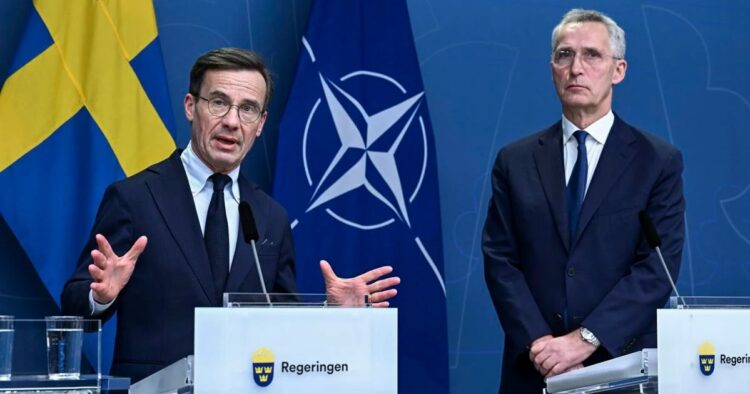In a significant move, Sweden has formally become the 32nd member of the North Atlantic Treaty Organization (NATO), ending decades of neutrality since World War II. The accession ceremony took place on March 7, with Swedish Prime Minister Ulf Kristersson and U.S. Secretary of State Antony Blinken presiding over the event at the State Department.
“This is a historic moment for Sweden, for the alliance, and for the transatlantic relationship,” stated Mr. Blinken. He emphasized the strengthened position of NATO, now larger and stronger than ever before.
Later in the day, Prime Minister Kristersson visited the White House and was honored as a guest at President Joe Biden’s State of the Union address to Congress. The White House hailed Sweden’s entry into NATO, asserting that it will enhance the safety of the United States and its allies.
NATO, described as the most powerful defensive alliance in history, gains a valuable addition in Sweden, following Finland’s entry last year. Both nations altered their long-standing neutrality policy in response to Russia’s invasion of Ukraine in 2022.
President Biden is anticipated to highlight Sweden’s NATO membership during his speech to Congress, showcasing it as a failure of Russian President Vladimir Putin’s attempts to weaken the alliance. Furthermore, the move is expected to bolster calls for increased military assistance to Ukraine, which has faced conflict for three years now.
Sweden’s path to NATO membership faced hurdles, primarily due to objections from existing NATO members Turkey and Hungary. Turkey expressed concerns regarding Sweden’s handling of Kurdish groups it considers terrorists, while Hungary, under President Viktor Orban’s leadership, displayed pro-Russian sentiments and reluctance to fully support Ukraine.
Despite these challenges, both Turkey and Hungary eventually ratified Sweden’s admission. Turkey did so earlier this year, and Hungary followed suit this week, clearing the way for Sweden’s formal entry into the alliance.
Significance of Membership
For Sweden, joining NATO marks a significant departure from its longstanding tradition of neutrality. It reflects the evolving security landscape in Europe and underscores the nation’s commitment to collective defense and stability in the region.
The addition of Sweden strengthens NATO’s capabilities and sends a clear message of solidarity against potential aggression. It also highlights the growing importance of cooperation and unity among Western democracies in the face of global challenges.
Overall, Sweden’s accession to NATO represents a pivotal moment in European security dynamics, with implications for regional stability and international relations.

















Comments